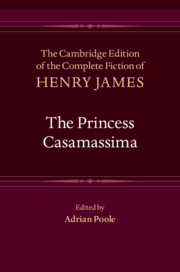Book contents
- Frontmatter
- Contents
- List of Illustrations
- Acknowledgements
- List of Abbreviations
- General Editors’ Preface
- General Chronology of James’s Life and Writings
- Introduction
- Textual Introduction
- Chronology of Composition and Production
- Bibliography
- The Princess Casamassima
- Glossary of Foreign Words and Phrases
- Notes
- Textual Variants I: Substantive Variants up to Copy Text
- Textual Variants II: Substantive Variants after Copy Text
- Emendations
- Appendix: Preface to New York Edition
XLIV
Published online by Cambridge University Press: 11 April 2021
- Frontmatter
- Contents
- List of Illustrations
- Acknowledgements
- List of Abbreviations
- General Editors’ Preface
- General Chronology of James’s Life and Writings
- Introduction
- Textual Introduction
- Chronology of Composition and Production
- Bibliography
- The Princess Casamassima
- Glossary of Foreign Words and Phrases
- Notes
- Textual Variants I: Substantive Variants up to Copy Text
- Textual Variants II: Substantive Variants after Copy Text
- Emendations
- Appendix: Preface to New York Edition
Summary
Hyacinth hurried down and got out of the house, but he had not the least intention of losing sight of Schinkel. The odd behaviour of the Poupins was a surprise and annoyance, and he had wished to shake himself free from it. He was candidly astonished at the alarm they were so good as to feel for him, for he had never perceived that they had gone round to the hope that the note he had signed (as it were) to Hoffendahl would not be presented. What had he said, what had he done, after all, to give them the right to fasten on him the charge of apostasy? He had always been a free critic of everything, and it was natural that, on certain occasions, in the little parlour in Lisson Grove, he should have spoken in accordance with that freedom; but it was only with the Princess that he had permitted himself really to rail at the democracy and given the full measure of his scepticism. He would have thought it indelicate to express contempt for the opinions of his old foreign friends, to whom associations that made them venerable were attached; and, moreover, for Hyacinth, a change of heart was, in the nature of things, much more an occasion for a hush of publicity and a kind of retrospective reserve; it couldn't prompt one to aggression or jubilation. When one had but lately discovered what could be said on the opposite side one didn't want to boast of one's sharpness — not even when one's new convictions cast shadows that looked like the ghosts of the old.
Hyacinth lingered in the street, a certain distance from the house, watching for Schinkel's exit and prepared to remain there if necessary till the dawn of another day. He had said to his friends, just before, that the manner in which the communication they looked so askance at should reach him was none of his business — it might reach him as it could. This was true enough in theory, but in fact his desire was overwhelming to know what Madame Poupin had meant by her allusion to a letter, destined for him, in Schinkel's possession — an allusion confirmed by Schinkel's own virtual acknowledgment.
- Type
- Chapter
- Information
- The Princess Casamassima , pp. 448 - 459Publisher: Cambridge University PressPrint publication year: 2020

